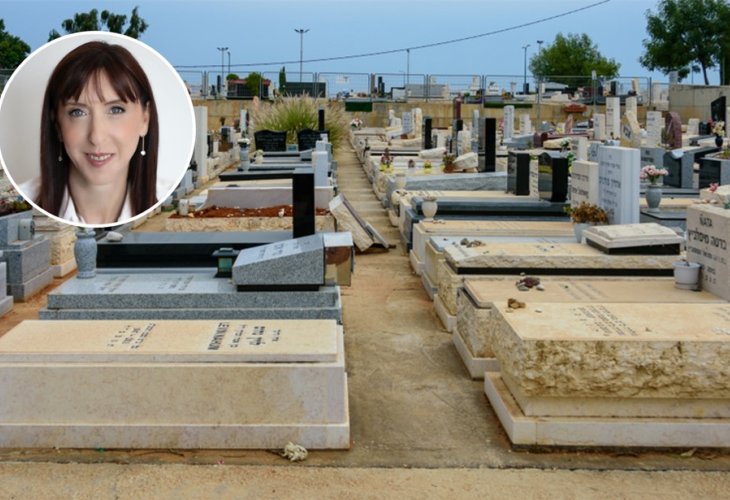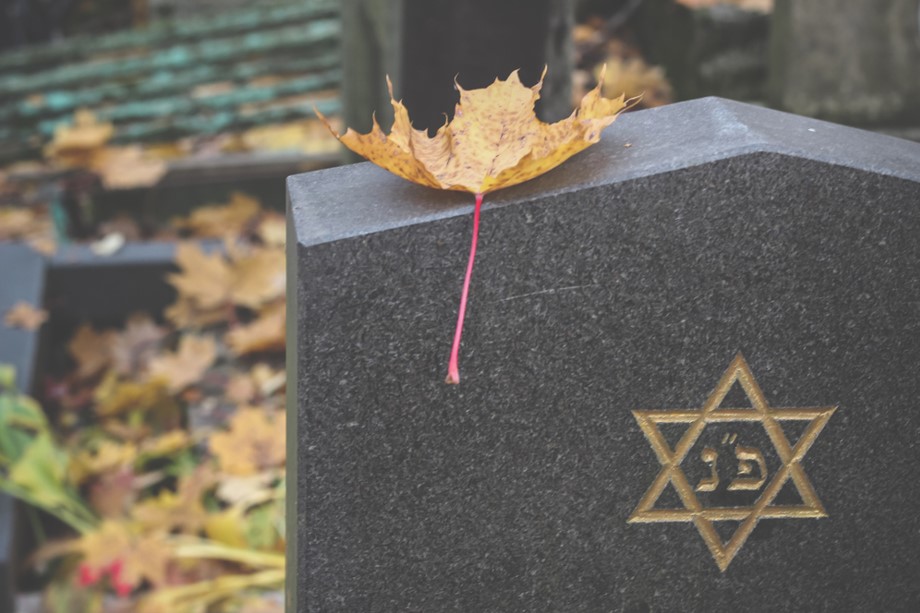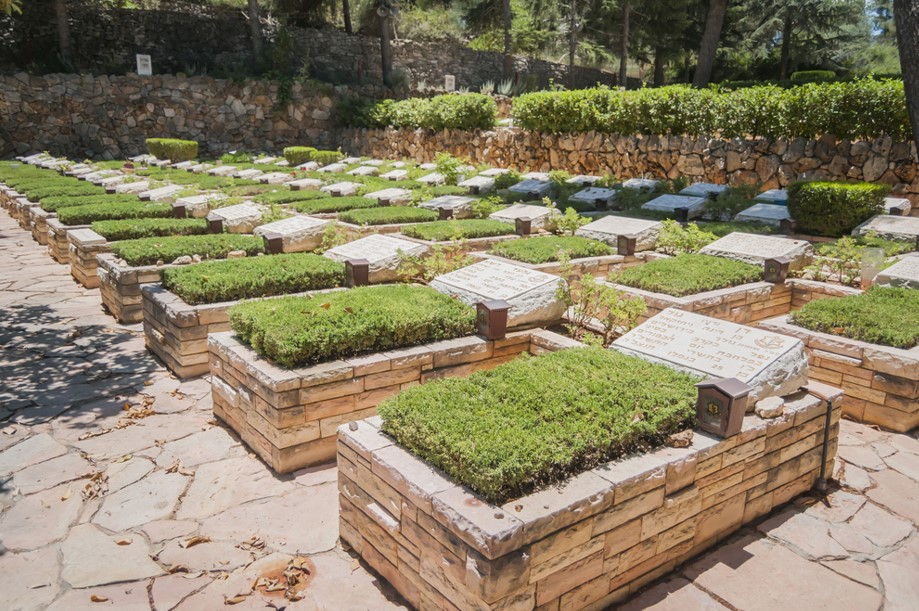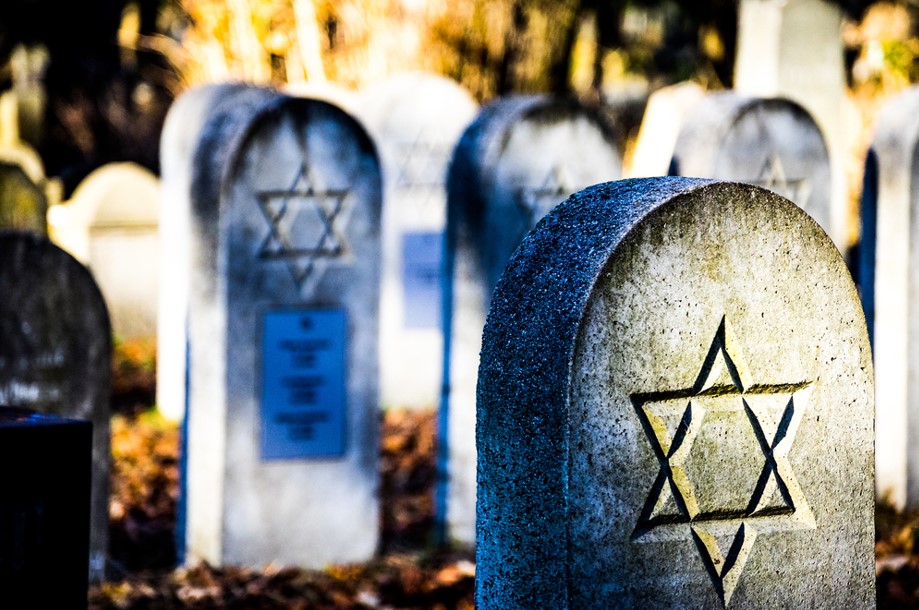Funeral Consultant: "Yes, It's a Real Profession, and I Deal with the Most Difficult Deaths"
Orit Masmi has worked in the burial field for 33 years, including managing a forum of about 600 Chevra Kadisha organizations in Israel. In a candid interview, she discusses her daily encounters with death, unexpected family reactions, and tragic funerals during the pandemic.
 In the circle: Orit Masmi (photo: shutterstock)
In the circle: Orit Masmi (photo: shutterstock)You can't avoid death. Each of us will encounter it eventually at some stage in our lives. But for some, death accompanies them throughout life and is part of their daily work. Such is the case for Orit Masmi, a strategic consultant in the burial field, who until about a year ago served as the CEO of the Chevra Kadisha forum in Israel. "I've actually been in the field for 33 years," she says in a brave interview, giving us a first-time glimpse into the burial world that often sounds intimidating and chilling.
"Sometimes people hear about my job and usually burst into laughter out of embarrassment," she admits, "often they are surprised and don't understand how a woman, in particular, works in such a field. Some don't really understand the role's significance and think I'm the one digging the graves myself. I'm used to all the reactions," she adds with a smile, recalling that Chevra Kadisha personnel are known for their dark humor. It might be what helps her endure such an unusual role.
 (photo: shutterstock)
(photo: shutterstock)From Student to CEO
How did you get into such an unusual field?
"The truth is I simply grew from the ground up," replies Orit, "It started as a summer job as a student at a local branch of Chevra Kadisha in Kfar Saba. I was called to copy plot maps, and thus began my work. Later, I studied chemistry, but at some point, I felt it didn't suit me. Alongside this, I started working as a clerk at the local Chevra Kadisha branch in Kfar Saba, then progressed to assistant CEO, and for the past ten years, I served as deputy CEO and CEO at the Chevra Kadisha forum in Israel, overseeing about 600 Chevra Kadisha bodies nationwide."
Is this a profession that requires formal education?
"Nowadays, there are training programs for burial workers, something I incorporated into the system, but when I started my role, no such training was needed. Of course, the experience I gained taught me a lot, and I think it is critical for such a position. Many goals and challenges arose from my deep familiarity with the field."
When Orit talks about challenges, she sighs. It turns out the issue is not simple at all. "First of all, bureaucratically, you need to understand that in Israel, there's not one big entity responsible for burials, but each area has a responsible body. So if two people even from the same city come to me and ask about something related to burial, each will get a different answer because things vary greatly from place to place.
"Overall, when working with families, I concluded that one of the things that greatly burden family members at the moment of losing a loved one is a lack of knowledge. In everyday life, no one wants to think about such a moment and doesn't give it thought. Therefore, when losing a relative, you find yourself in a position where no one knows what to do, and naturally, people start looking for answers. In the best case, they find someone knowledgeable, and in less fortunate cases, they get bad advice or are exploited by entities with financial interests. This prompted me to establish an information hotline *0120, where all current and important information can be obtained."
Incidentally, this is not the only thing Orit has advanced over the years. "The personal vision guiding me is to improve burial services in Israel. As part of this, I established a burial worker training program addressing both halachic aspects and interactions with families. The studies also extensively address burnout over the years and how to cope with facing death and family traumas."
She is also signed to an especially interesting project: "At one point, I established a website for the Chevra Kadisha forum, and when I mapped the queries received through the 'Contact' link, I discovered one thing repeatedly requested was help locating loved ones' graves. From this point, a unique project was born - a navigation app, a kind of 'Waze' that allows one to navigate through cemetery paths in the country, enabling anyone to receive the exact route to their loved one's grave. This is undoubtedly one of the most beneficial projects I have had the privilege to lead over the years."
Making Decisions at Difficult Times
As you meet the families of the deceased – what do you think gives them strength in such hard moments?
"As I see it – the main thing that strengthens families is the understanding that the death was not in vain. For example, you can see that parents of fallen IDF soldiers find more comfort because they feel there was a meaning to their son's sacrifice. The greater the meaning, the more strength one can draw to continue. This is also why when visiting the family during shiva and telling them how special and important the deceased was, it truly comforts and empowers them. Beyond that, there is, of course, the aspect of faith. Obviously, the more the family believes and knows their loved one hasn't disappeared, rather passed to a better world, they cope with the crisis more effectively. Personally, I think it’s tough to consider the loved one buried within a grave. As believing Jews, we know the body is there, but the soul is in a better place, making it all more understandable.
 (photo: shutterstock)
(photo: shutterstock)Who are typically the ones turning to you for guidance?
"Generally, it’s the relatives of the deceased, usually the ones who manage to maintain composure and create a separation between the emotional difficulty of loss and the technical need to handle procedures. They aren't necessarily cold-hearted people or ones who aren’t emotional. Often, these can be very sensitive people, only at the time of the passing, they haven't yet fully internalized what has happened.
"By the way, over the years I've concluded that people's reactions to death are unpredictable. It has happened more than once that I've encountered a family who suffered a disaster, a real tragedy, sometimes even losing several family members at once, yet they appear composed and restrained. On the other hand, some families come to arrange a funeral for a very old parent who died peacefully, yet they seem shattered. I've had the occasion to be at the funeral of a 90-year-old woman, and I just stood there and cried like a small child. Because the family felt they had undergone a tragedy. In any case, it's clear to me that in every situation, it's important I mobilize all my efforts to dissolve the sense of helplessness and convey as much practical knowledge as possible to aid in making right decisions regarding the burial and everything related to it.
What decisions, for instance, need to be made?
"Decisions about the burial site's location and the manner of burial need to be made, and because there is currently a land shortage in cemeteries, it's often that people cannot bury their loved ones exactly as they wished. I've met families who spent their last penny along with taking loans on purchasing a burial plot, only to realize later they could have acted differently and there were more affordable solutions."
To prevent such situations, Orit recommends to people reaching their late 70s and 80s to sit down and plan ahead for this moment. "It's not always pleasant to think about the day of death, but it's even less pleasant to know your children will have to make decisions that may not be right for you or that you’d prefer otherwise. It's possible to prepare a burial will or just simply say in words what you’d like to be done. But it’s important that it comes after understanding, thinking, and consultation.
And for the children, she says: "In these situations, it's crucial to look forward and understand that ultimately, we all want to honor the deceased, but today all burial solutions in Israel have been approved by the Chief Rabbinate, and one should always weigh the costs against the benefits. You don't necessarily have to choose the most expensive alternative."
She also thinks that the perseverance to bury right next to a grandparent often costs families a significant amount of energy and severe disappointments. "Clearly, initially, we would aspire for all family members to be buried near one another, and there's value in that, but today there are cemeteries closing or ones without burial spaces left. So if it’s impossible to bury next to a family member, one must understand it and move on. Just like in life, children sometimes move house and don't live near their parents."
 (photo: shutterstock)
(photo: shutterstock)The Goal: To Add Light
Over the years, Orit has been exposed to countless cases and situations that have left her in deep pain. For instance, on the eve of the last Seder night, a two-year-old girl died from one of the settlements that don’t have their cemeteries. The solution offered to the parents was to bury the girl in a distant cemetery, but they insisted on burial in the cemetery where the grandfather was buried. "The problem was it was a very crowded cemetery with no burial spaces," explains Orit. "Ultimately, a solution was found, and we buried the girl above the grandfather. You need to understand that all this involvement is very complex, especially as we aim to bring the deceased to a Jewish burial as swiftly as possible while time is ticking. It often happens that I am called to deal with an Israeli who died abroad and assist the family in bringing them back to the country quickly, mainly since certain Eastern European countries enforce autopsies and if delayed, there’s a risk of cremation. There is an enormous responsibility to assist families as quickly as possible. Of course, I get assistance from the Foreign Ministry and various contacts, as well as from extensive experience and connections."
Sometimes there's a fleeting thought that people involved in burial acquire a sort of immunity against experiencing such disaster themselves, or that if something like that happens to them, they are more resilient, but Orit emphasizes that’s not the case at all. "During the years, I met people that worked with me in the field for years, and when they lost a loved one, they reacted just like anyone else.
"Then, one day, I faced a particularly unusual story – a close neighbor of mine died a few hours before her son's wedding. I found myself organizing her funeral arrangements, simultaneously informing guests of the wedding's cancellation. Personally, it was very hard for me to recover from her sight – lying there coiffed and beautiful, with a dress hanging in the closet, just before the makeup artist arrived. This situation struck me at the most sensitive spot and remains with me until today. When I removed her jewelry and helped move her from the house, I knew that nothing in my field truly prepared me for these most difficult moments. No person can be immune to such sights."
And I can't help but ask – how did you handle the corona period, with the wave of deceased?
"In the first few months, we faced a very challenging situation. Although the increase in the number of deceased compared to regular days wasn't dramatic, at the beginning there was a lot of concern and uncertainty regarding the virus's ability to remain in the body after death. Therefore, we couldn't bury those who died from Corona in the usual manner, but only in plastic bags. It was very challenging to acclimate to this idea, but one of our people soon brought a brilliant idea – to use biodegradable plastic bags so that after some time, the bag disintegrates, and the deceased comes into contact with the earth. But still, a problem remained – since the deceased was enclosed in plastic, family members couldn't identify him. So, during those days, we photographed the deceased and sent the photos to families for identification. Later on, it became clear to me that some families kept these photos as lasting mementos, as it was their last image of the deceased who sometimes hadn't been seen for weeks due to hospitalization in the Corona ward. It’s something unimaginable for us."
For more than 30 years you've dealt with death daily. How does that affect you as a woman?
Orit takes a deep breath before explaining: "More than any struggle or pain, there is an enormous sense of mission here. I meet families at their most difficult moments, and when people come to me, they often feel truly lost. For me, it is a great privilege to extend a hand and lead them through this dark tunnel. So, despite the difficulty and the chilling tragedies passing by, I have great satisfaction. Studies also show that when you have a sense of mission from what you do, you can overcome even the hardest challenges."
And finally, she wishes to say one thing: "After so many years in this field, I’ve learned that external things like honor or money truly have no value. We should all strive to love and give as much as possible because, ultimately, the light we spread in the world is the only thing that'll remain here after we’re gone."

